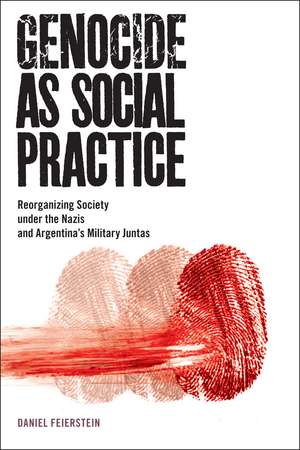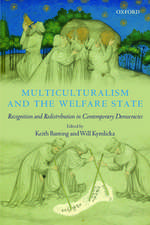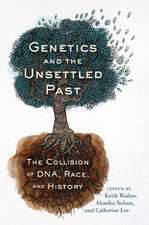Genocide as Social Practice: Reorganizing Society under the Nazis and Argentina's Military Juntas: Genocide, Political Violence, Human Rights
Autor Daniel Feierstein Traducere de Mr. Douglas Andrew Town Cuvânt înainte de Professor Alexander Laban Hintonen Limba Engleză Paperback – 14 mai 2014
Genocide not only annihilates people but also destroys and reorganizes social relations, using terror as a method. In Genocide as Social Practice, social scientist Daniel Feierstein looks at the policies of state-sponsored repression pursued by the Argentine military dictatorship against political opponents between 1976 and 1983 and those pursued by the Third Reich between 1933 and 1945. He finds similarities, not in the extent of the horror but in terms of the goals of the perpetrators.
The Nazis resorted to ruthless methods in part to stifle dissent but even more importantly to reorganize German society into a Volksgemeinschaft, or people’s community, in which racial solidarity would supposedly replace class struggle. The situation in Argentina echoes this. After seizing power in 1976, the Argentine military described its own program of forced disappearances, torture, and murder as a “process of national reorganization” aimed at remodeling society on “Western and Christian” lines.
For Feierstein, genocide can be considered a technology of power—a form of social engineering—that creates, destroys, or reorganizes relationships within a given society. It influences the ways in which different social groups construct their identity and the identity of others, thus shaping the way that groups interrelate. Feierstein establishes continuity between the “reorganizing genocide” first practiced by the Nazis in concentration camps and the more complex version—complex in terms of the symbolic and material closure of social relationships —later applied in Argentina. In conclusion, he speculates on how to construct a political culture capable of confronting and resisting these trends.
First published in Argentina, in Spanish, Genocide as Social Practice has since been translated into many languages, now including this English edition. The book provides a distinctive and valuable look at genocide through the lens of Latin America as well as Europe.
Download open access ebook here.
The Nazis resorted to ruthless methods in part to stifle dissent but even more importantly to reorganize German society into a Volksgemeinschaft, or people’s community, in which racial solidarity would supposedly replace class struggle. The situation in Argentina echoes this. After seizing power in 1976, the Argentine military described its own program of forced disappearances, torture, and murder as a “process of national reorganization” aimed at remodeling society on “Western and Christian” lines.
For Feierstein, genocide can be considered a technology of power—a form of social engineering—that creates, destroys, or reorganizes relationships within a given society. It influences the ways in which different social groups construct their identity and the identity of others, thus shaping the way that groups interrelate. Feierstein establishes continuity between the “reorganizing genocide” first practiced by the Nazis in concentration camps and the more complex version—complex in terms of the symbolic and material closure of social relationships —later applied in Argentina. In conclusion, he speculates on how to construct a political culture capable of confronting and resisting these trends.
First published in Argentina, in Spanish, Genocide as Social Practice has since been translated into many languages, now including this English edition. The book provides a distinctive and valuable look at genocide through the lens of Latin America as well as Europe.
Download open access ebook here.
| Toate formatele și edițiile | Preț | Express |
|---|---|---|
| Paperback (1) | 330.65 lei 6-8 săpt. | |
| Rutgers University Press – 14 mai 2014 | 330.65 lei 6-8 săpt. | |
| Hardback (1) | 828.66 lei 6-8 săpt. | |
| Rutgers University Press – 14 mai 2014 | 828.66 lei 6-8 săpt. |
Din seria Genocide, Political Violence, Human Rights
-
 Preț: 242.71 lei
Preț: 242.71 lei - 19%
 Preț: 512.61 lei
Preț: 512.61 lei -
 Preț: 283.63 lei
Preț: 283.63 lei -
 Preț: 279.10 lei
Preț: 279.10 lei -
 Preț: 325.35 lei
Preț: 325.35 lei -
 Preț: 231.34 lei
Preț: 231.34 lei -
 Preț: 255.79 lei
Preț: 255.79 lei -
 Preț: 326.60 lei
Preț: 326.60 lei -
 Preț: 314.87 lei
Preț: 314.87 lei -
 Preț: 304.82 lei
Preț: 304.82 lei -
 Preț: 316.25 lei
Preț: 316.25 lei -
 Preț: 282.66 lei
Preț: 282.66 lei -
 Preț: 313.73 lei
Preț: 313.73 lei -
 Preț: 522.18 lei
Preț: 522.18 lei -
 Preț: 315.86 lei
Preț: 315.86 lei - 28%
 Preț: 323.43 lei
Preț: 323.43 lei - 27%
 Preț: 186.15 lei
Preț: 186.15 lei -
 Preț: 340.40 lei
Preț: 340.40 lei - 27%
 Preț: 912.18 lei
Preț: 912.18 lei -
 Preț: 362.28 lei
Preț: 362.28 lei -
 Preț: 365.95 lei
Preț: 365.95 lei -
 Preț: 404.13 lei
Preț: 404.13 lei -
 Preț: 452.27 lei
Preț: 452.27 lei -
 Preț: 213.42 lei
Preț: 213.42 lei -
 Preț: 361.85 lei
Preț: 361.85 lei - 10%
 Preț: 911.46 lei
Preț: 911.46 lei -
 Preț: 361.12 lei
Preț: 361.12 lei - 10%
 Preț: 911.33 lei
Preț: 911.33 lei -
 Preț: 298.90 lei
Preț: 298.90 lei
Preț: 330.65 lei
Nou
Puncte Express: 496
Preț estimativ în valută:
63.29€ • 68.77$ • 53.20£
63.29€ • 68.77$ • 53.20£
Carte tipărită la comandă
Livrare economică 21 aprilie-05 mai
Preluare comenzi: 021 569.72.76
Specificații
ISBN-13: 9780813563176
ISBN-10: 0813563178
Pagini: 276
Dimensiuni: 152 x 229 x 20 mm
Greutate: 0.41 kg
Ediția:None
Editura: Rutgers University Press
Colecția Rutgers University Press
Seria Genocide, Political Violence, Human Rights
ISBN-10: 0813563178
Pagini: 276
Dimensiuni: 152 x 229 x 20 mm
Greutate: 0.41 kg
Ediția:None
Editura: Rutgers University Press
Colecția Rutgers University Press
Seria Genocide, Political Violence, Human Rights
Notă biografică
DANIEL FEIERSTEIN is the director of the Centre for Genocide Studies at the National University of Tres de Febrero in Argentina. He is the current president of the International Association of Genocide Scholars and has consulted for the United Nations in several projects.
Cuprins
Foreword
Acknowledgments
Introduction: Bridging the Gap between Two Genocides
Part One: Some Theoretical Questions
1. Defining the Concept of Genocide
2. Toward a Typology of Genocidal Practices
3. Reconciling the Contradictions of Modernity: Equality, Sovereignty, Autonomy, and Genocidal Practices
Part Two: Historical Foundations: The Nazi Genocide
4. Discourse and Politics in Holocaust Studies: Uniqueness, Comparability, and Narration
5. The Problem of Explaining the Causes of the Nazi Genocides
6. Reshaping Social Relations through Genocide
Part Three: Toward a Historical Basis: Genocidal Social Practices in Argentina
7. Explaining Genocidal Social Practices in Argentina: The Problem of Causation
8. Toward a Periodization of Genocide in Argentina
9. Concentration Camp Logic
10. In Conclusion: The Uses of Memory
Notes
Index
Acknowledgments
Introduction: Bridging the Gap between Two Genocides
Part One: Some Theoretical Questions
1. Defining the Concept of Genocide
2. Toward a Typology of Genocidal Practices
3. Reconciling the Contradictions of Modernity: Equality, Sovereignty, Autonomy, and Genocidal Practices
Part Two: Historical Foundations: The Nazi Genocide
4. Discourse and Politics in Holocaust Studies: Uniqueness, Comparability, and Narration
5. The Problem of Explaining the Causes of the Nazi Genocides
6. Reshaping Social Relations through Genocide
Part Three: Toward a Historical Basis: Genocidal Social Practices in Argentina
7. Explaining Genocidal Social Practices in Argentina: The Problem of Causation
8. Toward a Periodization of Genocide in Argentina
9. Concentration Camp Logic
10. In Conclusion: The Uses of Memory
Notes
Index
Recenzii
“This work provides a provocative analysis of the relationship between modernity and state policy through the mechanism of genocidal social practice. A seminal contribution from a major scholar in the field.”
"Genocide as Social Practice makes its English language debut after successful publication in its original Spanish. Feierstein provides a critical analysis of the genocidal policies of Nazi Germany and the Argentine junta. Feierstein shows that the terror brought forth by the junta, often referred to as the 'dirty war,' shared many goals with the terror of perpetrators of the Holocaust. Feierstein has established himself as a go-to voice on the Argentine genocide, which is solidified here. Recommended."
Descriere
Genocide not only annihilates people but also destroys and reorganizes social relations, using terror as a method. In Genocide as Social Practice, Argentinean social scientist Daniel Feierstein looks at the policies of state-sponsored repression pursued by the Argentine military dictatorship against political opponents between 1976 and 1983 and those pursued by the Third Reich between 1933 and 1945. He finds similarities, not in the extent of the horror but in terms of the goals of the perpetrators.
















